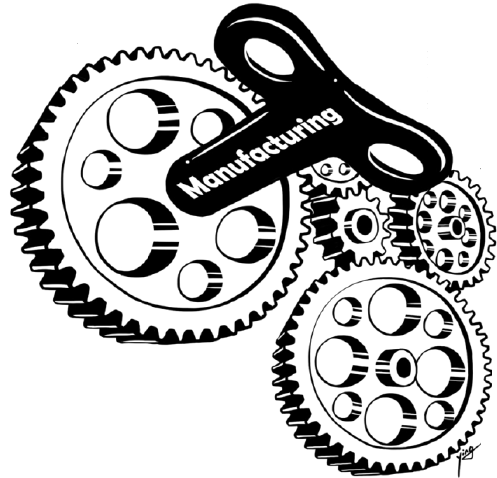 |
|
WANG XIAOYING/CHINA DAILY |

Nothing demonstrates the striking power shift between China and the United Kingdom more than the planned investment by China into a high-speed railway and nuclear power station in the UK, deals clinched during President Xi Jinping's recent state visit.
While the UK's industrial advantages have declined, China's have grown. Branded the "world's factory", China is the only country that boasts all the industrial categories as classified by the United Nations. Aside from advantages in traditional labor-intensive manufacturing and consumer goods, China has also gained an upper hand in equipment manufacturing, in which its output now accounts for one-third of the world's total, 2.5 times that of Germany, which ranks second. All this has laid a solid foundation for China's ascension to become the world's second-largest economy.
However, there are also pressures threatening China's role as "world's workshop". Such pressures are not just from pure economic factors such as soaring labor costs, but also from the fact that the market value of domestic electronics giants with numerous patents and annual profits of billions of yuan is lower than that of some loss-suffering enterprises whose market value is only based on speculative concepts.
Such concerns are aggravated by the fact that a number of domestic manufactures have shifted their business to real estate and capital operations and there is declining enthusiasm among university students to study science and technology majors.
However, manufacturing is the country's economic backbone and more importance should be paid to consolidating it as the foundation of the domestic manufacturing sector.
It should be noted that a big country's sustainable economic development can only be built on industrialization, because the modern service sector, which provides the majority of people with decent incomes and employment opportunities, is also built on the foundation of modern manufacturing. This is true not only for developing countries but also developed countries and economies.
If China's aim in the past was how to economically catch up with and surpass developed countries, then its current aim should be how to prevent itself from being overtaken.
Is China's manufacturing sector able and determined to pursue further development and prevent itself from being overtaken by its counterparts in the rest of the world? The answer is yes. A series of emerging trends, from intensified efforts to try new business models and open new markets by some domestic manufacturers to the exploration of the "Internet plus" model, show the foresight and adaptability of domestic producers.
In 2014 alone, a total of 53,140 scientific and technological fruits were registered in China and applications were filed for more than 1.3 million patents. Meanwhile, China's R&D input was 2.09 percent of its gross domestic product that year. The proportion was even higher among such manufacturing giants as TCL.
What China now lacks is not excellent and hardworking technicians and scientists, nor entrepreneurs with a strong market vision and the courage to withstand pressure, nor enthusiastic investors and capital. What it lacks is equitable evaluation of its manufacturers and positive incentives.
It is hoped that the 13th Five-Year Plan (2016-20) can give the domestic manufacturing sector a deserved status and the capital market reasonably evaluates enterprises.
The author is a researcher at the Ministry of Commerce's International Trade and Economic Cooperation Institute.

I’ve lived in China for quite a considerable time including my graduate school years, travelled and worked in a few cities and still choose my destination taking into consideration the density of smog or PM2.5 particulate matter in the region.